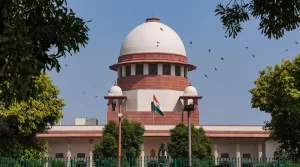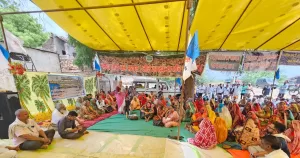Press Release, 22 Dec 2021
Thousands Protest Against Karnataka Anti-Conversion Bill In Bangalore
Today the streets of Bangalore saw an outpouring of citizens in large numbers to protest against the anti-people and unconstitutional ‘Karnataka Protection of Right to Freedom of Religion Bill 2021’. The rally began from Mysore Bank Circle and culminated at Freedom Park. A broad coalition of more than 40 organisations vociferously demanded that the Bill be withdrawn as the Government of Karnataka is trampling upon the constitutionally guaranteed rights to freedom of religion, privacy and dignity.
Speaking at the protest, advocate and constitutional law expert Arvind Narrain said that the Supreme Court has recognised that individuals have the freedom to dress the way they want, eat what they want and practise the faith they want. The bill by seeking to target conversions interferes with both the human right to dignity and the freedom to practise the faith of their choice.
Gowramma of Janwadi Mahila Sanghatan stated that these are dark days in Karnataka and the bill is not just an attack on religion but an attack on all women. The bill presumes that women and individuals from Dalit and SC communities do not have the agency to decide the religion they want to belong to. Demanding that the state withdraw the bill, she asked that the government should instead be paying attention to problems of nutrition, unemployment and rising violence against women.
Archbishop of Bengaluru Peter Machado urged the state to reconsider the bill and withdraw it. The bill is harmful to not only Christians but also many other communities. He pointed out that many laws exist already to prevent forced conversions. The Christian community has always served the country and its poor and forced conversions are a mortal sin for us, he added.
Yousuf Kunhi, Jamaat-e-Islami, Karnataka chapter, directly addressing the Lingayat MLAs in Karnataka’s assembly, stated that by supporting the bill, they would be going against Basavanna’s teachings. He also asked all the supporters of the bill in the Assembly to resign because they won the elections on the basis of the constitution and promised development, progress and communal harmony. If they cannot deliver on these promises, they have no right to continue in office, he added.
C.S. Dwarkanath, former chairperson of the State Backward Classes Commission, asked on what basis was the law being formulated without any discussions with experts and lawyers. Citing Ambedkar’s stance on conversion, he said that the constitution-maker had declared that people should not be born into a religion but should be allowed to choose their faith. It is also the inherent discrimination and the absence of fraternity within Hindu religion that prompts people to convert, he pointed out.
Clifton D’Rozario from All India Lawyers Association for Justice stated that this is a fascist attack on minorities, women and the oppressed in our society. Pointing to the Chief Minister BS Bommai attending an event organised by the Vishwa Hindu Parishad and Bajrang Dal in the middle of the assembly session, he said that the CM had called conversion a big disease, the government was tackling it through such laws but the VHP and Bajrang Dal should start a state wide campaign about this. All this highlights the ways in which the fascist political project is being implemented through the law.
Ruth Manorama of Women’s Voice highlighted her own Dalit Christian identity and said that as an activist with 40 years of experience working with slum residents, Dalits and women and the capacity to mobilise lakhs of people, she had not converted even one individual. Arguing that the bill is anti-Christian, anti-Muslim, anti-Buddhist, she said that as citizens we believe in secularism and will protect it till our death.
Advocate BT Venkatesh, activist Akkai Padmashali, writer Sharifa, among others also spoke at the protest.
Large number of people gathered to register their protest against this unconstitutional bill. Through speeches, resistance music and constitutional slogans we demanded that the Government take back the bill.
Note on the Unconstitutional Nature of the ‘Karnataka Protection of Right to Freedom of Religion Bill 2021’
Our protest against the bill is grounded in the understanding of the freedoms guaranteed by the Constitution, whose maker is none other than Babasaheb Ambedkar. The bill, falsely citing the prevalence of forced conversion seeks to prohibit conversion by misrepresentation, force, undue influence, coercion, and allurement. In reality, it aims to criminalize the practice of faith and openly assault fundamental rights to individuals.
The presumption underlying this bill is that there is some sinister motive behind a person converting and that legitimises this open assault on the right to freely practice religion under Article 25 of the Constitution. This bill is being brought in by creating a myth of ‘forced conversion’ and ‘forced mass conversion’ when there are none. The census statistics actually shows that the proportion of Christian population in India and in Karnataka is on a steady decline. Despite this, the bill is being rammed through to legitimise hate crimes against minorities.
Specific unconstitutional provisions of the bill
Vague definition of allurement: The provisions of the bill are so broad and vague that any act could be construed as allurement. For example, the term allurement is defined to include any gift, employment, free education, glorifying one religion against another, among other things. Acts of kindness and social service are thus criminalized. It also allows for officials implementing the law to be arbitrary in their interpretation of what constitutes allurement and opens individuals and communities for harassment.
The term “glorifying one religion over another” is manifestly arbitrary. If an individual were to say ‘Hinduism provides a way of life and is better than other religions’, it could very well be construed to be glorifying Hinduism over other religions. Yearning for a better life through free education even when right to education is a fundamental right is criminalised if religious institutions provide free education. It goes on to include “portraying practice, rituals and ceremonies or any integral part of a religion in a detrimental way vis-à-vis another religion” as allurement. By that logic, religious practices which are an affront to the constitution such as sati, dowry, the caste system cannot be critiqued. Further, it prohibits the exercise of the fundamental right to freedom of speech and expression, which includes the right to speak freely about religion.
Legitimises hate crimes against minorities: The Bill effectively legitimises hate crimes against Christians and Muslims. The protests against the Bill are being held in a climate of hatred against minorities in Karnataka. In the course of this year, as the Peoples Union for Civil Liberties (PUCL-K) has documented there are over 39 attacks on Christians and 71 instances of communal policing and hate crimes against Muslims. Instead of initiating action against the perpetrators of these hate crimes, the government is targeting them through this Bill.
Gives power to the state to determine the ‘genuineness’ of intention: What is shocking is that the Bill requires a District Magistrate to be intimated 30 days before converting by both the individual as well as the religious figure effectuating the conversion. Thereafter, the District Magistrate through the police has the power to investigate into the ‘genuine intention, purpose and cause of the proposed conversion’. How can anyone but the individual themselves investigate into the ‘genuine intention of proposed conversion’? Failure of an individual who is converting to do the same would result in his conviction for a minimum of one year and upto 3 years. It thus criminalizes the mere act of faith.
The nine-judge bench of the Supreme Court in the Puttaswamy decision of 2015, has unequivocally held that the right to choose one’s religion remains a core part of one’s fundamental right to freedom of religion under Article 25, right to dignity under Article 21 and is an integral part of one’s right to privacy. By presuming that in all cases of conversion there is some sinister motive behind conversion, which the District Magistrate through the police has to enquire into, this Bill if enacted, will take away the right to choose one’s faith which is a fundamental aspect of both privacy and dignity. The Supreme Court in Puttaswamy v. Union of India interpreted the right to privacy and dignity to hold,
‘…liberty enables the individual to have a choice of preferences on various facets of life including what and how one will eat, the way one will dress, the faith one will espouse and a myriad other matters on which autonomy and self-determination require a choice to be made within the privacy of the mind.’
Disproportionate burden on the person intending to convert: The Bill places the entire burden on the individual who has converted to prove that the said conversion is not by way of force. This is a disproportionate burden on individuals that are converting. It even goes on to categorise forcible conversion as a non bailable, cognizable offence, making getting bail extremely difficult for merely converting to another religion.
Depriving women and SC/ST persons of agency: It prescribes a higher punishment in case women, SC/ST persons are converted, reflecting thereby the patriarchal presumptions of the bill that somehow women and SC/ST persons are incapable of making choices about their own lives and are more susceptible to propaganda than upper-caste men. It also presumes that somehow it is far worse for the society if women and SC/ST persons choose to convert. We see that the Bill targets the right to choose one’s faith with particular implications for SC/ST persons as well as women.
Assault on inter-faith relationships, including marriages: The Bill apart from targeting the practice of faith also seeks to enact a prohibition on what it calls, ‘conversion for the sake of marriage’. This is a direct assault on inter-faith relationships and inter-faith marriages. Instead of taking action against such attacks as mandated by the Supreme Court, this Bill seeks to legitimize attacks on inter-faith couples. This is nothing other than a patriarchal mindset which undermines the ability of women to make choices about their personal and intimate lives.
This Bill if passed will undermine our precious constitutional rights to faith, autonomy and choice, marriage as well as the underlying constitutional value of dignity. For these reasons we oppose the passing of the Bill and demand that it be withdrawn.
We reject this hate politics and want a Karnataka of Basavanna’s dream!
(For full list of organisations that participated in the protest, see Countercurrents.org website. Courtesy: Countercurrents.org.)




